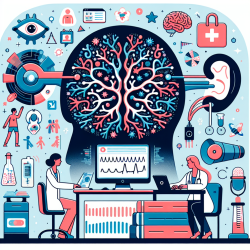In an era where digital solutions are increasingly becoming part of our everyday lives, web-based therapy offers an exciting frontier in mental health care. According to the research article "Implementing Web-Based Therapy in Routine Mental Health Care: Systematic Review of Health Professionals’ Perspectives," web-based therapy holds significant promise for enhancing accessibility and reducing costs. However, its adoption in routine settings remains limited.
Health professionals are pivotal in the successful implementation of web-based therapies. The research highlights several key themes that practitioners can leverage to improve their skills and better integrate these innovative approaches into their practice.
1. Embrace Tailoring
One major finding from the research is the need for web-based therapies to offer tailored content. Health professionals noted that while structured programs are easier to navigate, they can feel too rigid. Tailoring the therapy to meet individual patient needs can significantly enhance engagement and reduce dropout rates.
2. Target Suitable Patients
Web-based therapy is not a one-size-fits-all solution. Health professionals support its use for patients with mild to moderate anxiety and depression, who have good computer literacy, motivation, and low comorbidity. Identifying the right candidates for web-based therapy can lead to better outcomes and higher satisfaction rates.
3. Blend Therapy Approaches
Health professionals show a clear preference for blended therapy models that combine web-based components with face-to-face interactions. This approach facilitates rapport building, allows for active monitoring, and ensures that patients receive the necessary support throughout their treatment journey.
4. Select Appropriate Therapeutic Content
Not all therapeutic approaches are equally suited for web-based formats. Prioritizing psychoeducation, monitoring, and skills practice while reserving more complex interventions for face-to-face sessions can increase health professionals' confidence in recommending web-based therapies.
5. Educate and Train Health Professionals
Lack of familiarity with web-based therapies is a significant barrier. Health professionals need education and training to understand the content, processes, and evidence base of these therapies. Training should also cover how to make appropriate referral decisions and integrate web-based treatments into routine care.
6. Design Supportive Systems
- Ensure engaging work and appropriate supervision for health professionals.
- Provide adequate technological resources and data security.
- Develop clear policies regarding confidentiality, risk management, and liability.
- Secure support from management for the use of web-based therapies.
By addressing these areas, health professionals can significantly enhance the uptake and effectiveness of web-based therapies. As we continue to explore and integrate digital solutions, it is essential to keep refining our approaches based on ongoing research and feedback from both patients and practitioners.
To read the original research paper, please follow this link: Implementing Web-Based Therapy in Routine Mental Health Care: Systematic Review of Health Professionals’ Perspectives.










